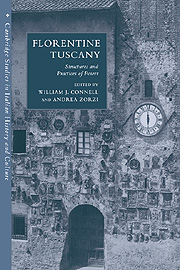Book contents
- Frontmatter
- Contents
- List of figures
- List of tables
- List of abbreviations of archival sources
- Introduction
- 1 The ‘material constitution’ of the Florentine dominion
- 2 The language of empire
- 3 Constitutional ambitions, legal realities and the Florentine state
- 4 Fiscality, politics and dominion in Florentine Tuscany at the end of the middle ages
- 5 Market structures
- 6 State-building, church reform and the politics of legitimacy in Florence, 1375–1460
- 7 The humanist citizen as provincial governor
- 8 Territorial offices and officeholders
- 9 Demography and the politics of fiscality
- 10 Florentines and the communities of the territorial state
- 11 Patronage and its role in government: the Florentine patriciate and Volterra
- 12 San Miniato al Tedesco: the evolution of the political class
- 13 The social classes of Colle Valdelsa and the formation of the dominion (fourteenth–sixteenth centuries)
- 14 Arezzo, the Medici and the Florentine regime
- 15 Rubrics and requests: statutory division and supra-communal clientage in Pistoia
- 16 A comment
- Index
- CAMBRIDGE STUDIES IN ITALIAN HISTORY AND CULTURE
13 - The social classes of Colle Valdelsa and the formation of the dominion (fourteenth–sixteenth centuries)
Published online by Cambridge University Press: 16 September 2009
- Frontmatter
- Contents
- List of figures
- List of tables
- List of abbreviations of archival sources
- Introduction
- 1 The ‘material constitution’ of the Florentine dominion
- 2 The language of empire
- 3 Constitutional ambitions, legal realities and the Florentine state
- 4 Fiscality, politics and dominion in Florentine Tuscany at the end of the middle ages
- 5 Market structures
- 6 State-building, church reform and the politics of legitimacy in Florence, 1375–1460
- 7 The humanist citizen as provincial governor
- 8 Territorial offices and officeholders
- 9 Demography and the politics of fiscality
- 10 Florentines and the communities of the territorial state
- 11 Patronage and its role in government: the Florentine patriciate and Volterra
- 12 San Miniato al Tedesco: the evolution of the political class
- 13 The social classes of Colle Valdelsa and the formation of the dominion (fourteenth–sixteenth centuries)
- 14 Arezzo, the Medici and the Florentine regime
- 15 Rubrics and requests: statutory division and supra-communal clientage in Pistoia
- 16 A comment
- Index
- CAMBRIDGE STUDIES IN ITALIAN HISTORY AND CULTURE
Summary
The elevation of towns to cities from the late middle ages to the modern period is a theme that historians have only recently begun to study. Giorgio Chittolini has linked the general process of elevation to city that took place in Tuscany in the late middle ages to the reorganisation that followed the great territorial expansion of Florence in the early fifteenth century, and Elena Fasano Guarini has highlighted the particular significance of city status in the early modern period.
I should like to investigate the possible motives of the local ruling classes to support the efforts to gain diocesan and city status. In particular, I should like to address the following questions. What was the relationship between the needs of the dominant city and the expectations of the towns themselves? What local interests were satisfied by the elevation of a town (terra) to the rank of ‘city’ (civitas)? And how and why did such interests find support in the dominant city only at certain key moments? I believe these are important questions, the answer to which will lead to a clearer understanding of the structure of the Florentine territorial state and of the changes resulting from the slow assimilation into a vast territorial entity of localities which had previously experienced periods of significant autonomy.
- Type
- Chapter
- Information
- Florentine TuscanyStructures and Practices of Power, pp. 264 - 292Publisher: Cambridge University PressPrint publication year: 2000



